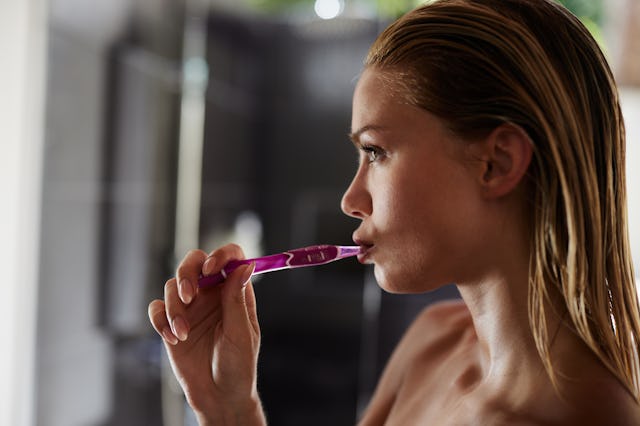TikTok Hairstylists Say Sleeping On Wet Hair Causes It To Mold & I Can’t Handle Anymore Knowledge
I need this damn app to stop giving me new things to worry about.

Drinking clove water daily, cleaning the seals around my washing machine’s door, and doing affirmations with my kid every night before bed — if we did everything TikTok suggests we do, there’d be no time for anything else in a day. But in recent months, hairstylists have been posting about how they can tell which clients go to sleep with wet hair because their hair smells moldy (*gag*). Can sleeping on wet hair really cause it to mold? We asked a dermatologist to weigh in.
Stylists on TikTok say that, yes indeed, going to sleep with wet hair can cause mold to grow on your scalp. In turn, you could experience fungal infections or irritation and itchiness, they argue. And there are countless videos of us average Janes now religiously blow-drying our hair before bed because we’ve caught wind of this possibility.
So, is going to sleep with wet hair really going to cause mold on your scalp? “Certainly, a damp, moist environment is more prone to fungal infections, so I think this is a possibility. But I think occasionally falling asleep with a damp scalp is not a big deal,” says Brooke Jeffy, M.D., a board-certified dermatologist in Scottsdale, Arizona, and founder of youth skincare brand BTWN. “I just would not make it a nightly habit, especially if you are prone to rashes, dandruff, or breakouts in the scalp.”
If you actually do deal with any of those issues — dandruff, scalp rashes, or itchiness — you could try sleeping with dry hair for a week or so to see if it really does help. And don’t hesitate to try other solutions, too. A combined approach might help you find relief faster.
“If you are experiencing a rash, flaking or discomfort in the scalp, it is reasonable to try a medicated dandruff shampoo and be sure not to sleep with wet hair, but certainly see a dermatologist if problems persist,” Jeffy adds.
She notes that while it’s possible going to bed with wet hair regularly is what’s leading to an itchy or irritated scalp, there are so many possible causes that it’s hard to blame just one. In fact, not showering enough is a more common reason she sees this issue in her own patients. “I see many people with itchy, irritated scalps because they simply do not shampoo enough. And, of course, there are medical conditions that can affect the scalp.”
So, while there have always been reasons not to sleep with wet hair — it contributes to breakage, Jeffy says, and who needs that — avoiding an itchy scalp and musty-smelling hair may actually be another one. *Sigh*... let’s all go plug in our blow dryers.